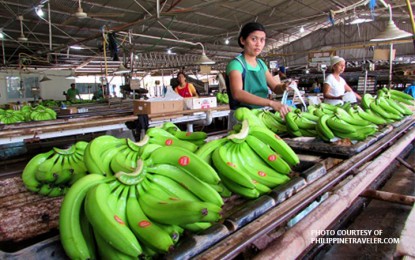
(PNA file photo)
MANILA – The Davao Marsman Agrarian Reform Beneficiaries Multi-Purpose Cooperative (DAMARB MPC), representing 697, or 92 percent, of the 762 agrarian reform beneficiaries (ARB) of the Marsman Estate Plantation, Inc. (MEPI), wants to continue with its contract of lease with the export banana plantation company.
Hernando Rivero, chairman of DAMARB MPC, in a statement on Tuesday, said the farmer-members have recognized the importance of having a lease contract with a stable company, which has become more significant these days as they face the challenges brought about by the pandemic that is affecting not only the country but the entire world.
“The other 164 ARBs who chose not to lease their lands to MEPI, like the members of Marsman Agrarian Reform Beneficiaries Cooperative (MARBCO) and later Marsman Individual Farming Agrarian Reform Beneficiaries Cooperative (MIFARBCO), opted to acquire the land through the voluntary offer to sell (VOS) scheme of DAR (Department of Agrarian Reform) and to become independent growers," he said.
Right now, Rivero said, the MARBCO and MIFARBCO ARBs are buried in debt to their investors and have been delinquent in their land amortizations with the Land Bank of the Philippines.
"Sadly, their farms are now facing serious problems with Panama disease that are threatening their existence. This is also the fate of many other independent growers in the banana industry,” he said. “Compare this with us at DAMARB whose members remain insulated from these problems because we have a fixed land rental scheme, which MEPI recognizes come hell or high water,” he pointed out.
The DAMARB MPC issued the statement in the light of developments where the Presidential Agrarian Reform Council (PARC) is expected to decide soon on DAMARB-MPC’s and MEPI’s motions for reconsideration on PARC's Resolution 2016-30-05 dated Sept. 12, 2016. This resolution approved the revocation of the lease agreement of MEPI and DAMARBDEVCO (now DAMARB MPC).
While the motions for reconsideration were pending resolution, MEPI and DAMARB MPC continued to talk and amended their land lease contracts under the guidance of the Provincial Agrarian Reform Coordinating Committee (PARCCOM) in Davao del Norte.
The latest amendment to the contract made in December 2019 and signed by individual ARBs saw land rentals and incentives increasing from the existing PHP50,000 per hectare per year to PHP90,000, recognized as among the highest-ever land rental plus the incentive, not only in the banana-growing industry but in the entire farming sector.
In retrospect, Rivero said it was perhaps one of the best decisions made by the members of DAMARB-MPC because, in the succeeding years, the banana sector suffered severe setbacks brought about by Panama disease and the substantial drop of banana prices in the international markets.
According to data from the Philippine Statistics Authority (PSA), total Cavendish exports in 2020 reached only 3.4 million metric tons (MT), or 17 percent lower than the record-high shipment of 4.1 million MT in 2019.
The PSA data also showed that export receipts from Cavendish shipments in 2020 declined by 20.6 percent to USD1.55 billion from USD1.95 billion.
From January to June, the situation was worse as total Cavendish exports dropped by 88.5 percent or to one million tons from two million tons, Rivero said.
Export values for the same period, meanwhile, fell 75 percent to USD499 million from USD875 million.
“In our 5th Amendment to contract of lease, each of our ARB-member is entitled to receive an annual variable production incentive beginning 2019. For the years 2019 and 2020, since MEPI achieved a production of more than 4,300 boxes, our ARBs received an additional PHP80,000 for two years,” he said.
Rivero also pointed out that MEPI “assumed the payment of all local taxes for our lands and for its improvements. To compare, real property taxes on the lands awarded to ARBs of other cooperatives remain delinquent because of their inability to pay the same.”
He also noted that “each member-ARB, or in his stead a member of his household, is granted employment preference, health insurance, and even mortuary benefit in case of death of the ARB."
"It is worthy to emphasize that these economic benefits neither cost the government nor the ARB a single centavo as the properties were donated to us, in consideration for the lease,” he said.
Rivero said their group prefers "to stick it out with MEPI, and we hope the government will not revoke our agreements with MEPI. Otherwise, the government will impoverish us instead of empowering us all the more during this time of the pandemic.”
The MEPI donated the 799-hectare banana plantation to DAMARB-MPC in consideration of a lease-back agreement of 30 years, with corresponding land rentals to be paid by MEPI.
The lease agreement was approved by the PARC, which, at that time, was headed by former president Gloria Macapagal-Arroyo, on the condition that the land would be subdivided and individually titled to the ARBs who could then freely choose what they want to do with their own land.
"(The) 762 ARB-members of the DAMARB-MPC chose to enter into an individual lease contract with MEPI. With our motions for reconsideration pending resolution by the PARC, the overwhelming majority of the ARB-members of the DAMARB-MPC hope that the PARC will act in their and their dependent’s best interest, and resolve to uphold the validity of the lease contracts,“ Rivero said. (PR)
